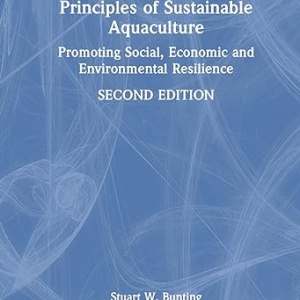
This book is an updated and revised introduction to sustainable aquaculture practices with special attention to the social, economic and environmental issues and corresponding potential solutions.
Summary
This second edition aims to provide an introduction of sustainable aquaculture and the social, economic and environmental resilience of the practice aimed at students, researchers and professionals in the field. This edition has been updated to reflect new developments in aquaculture, fisheries and water resource governance. Drawing from case studies, this book showcases where progress has been made and provides guidance for sustainable aquaculture uptake. It has a specific focus on providing information that is appropriate to a range of environmental, geographic, socio-economic and political contexts.
Publisher’s summary
This book provides an introduction to sustainable aquaculture practices, focusing on how we develop social, economic and environmental resilience.
Aquaculture has seen phenomenal worldwide growth in the past 50 years, and many people view it as the best solution for the provision of high-quality protein to feed the world's growing population. This new edition has been fully revised and updated to reflect new developments in the field and includes new case studies. Focusing on developing more sustainable aquaculture practices and aquatic food systems, the book provides a toolbox of approaches to support widespread adoption and appropriate adaptation of regenerating aquaculture strategies, ensuring that it has practical relevance for both students and professionals. Drawing on a range of case studies from around the world, the book shows where progress, in terms of developing ecologically sound and socially responsible forms of aquaculture, has been made. The book is based on extensive evidence and knowledge of best practices, with guidance on appropriate adaptation and uptake in a variety of environmental, geographic, socio-economic and political settings. Concentrating on low-impact aquaculture systems and approaches, which have minimal adverse effects on the environment, the book also emphasizes socially responsible and equitable aquaculture development to enhance the natural resource base and livelihoods.
Principles of Sustainable Aquaculture is essential reading for students and scholars of aquaculture, fisheries, marine and water resource governance, and sustainable agriculture and sustainable food systems more broadly. It will also be of interest to professionals working in the aquaculture and fisheries industries.
Reference
Bunting, S.W., 2024. Principles of Sustainable Aquaculture: Promoting Social, Economic and Environmental Resilience, 2nd edition. ed. Routledge, New York, NY.
Read more here and see our blog To eat fish or not to eat fish? That is the wrong question







Post a new comment »